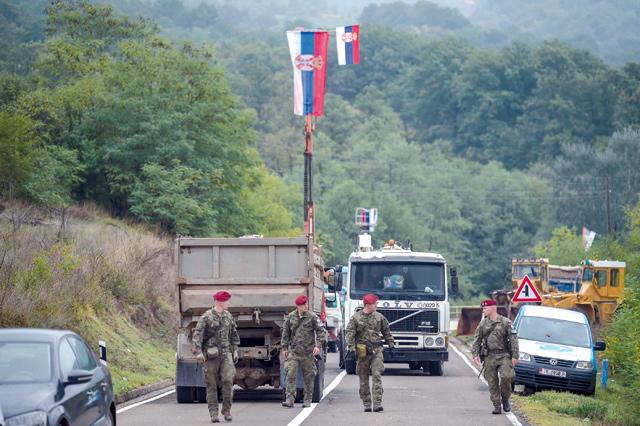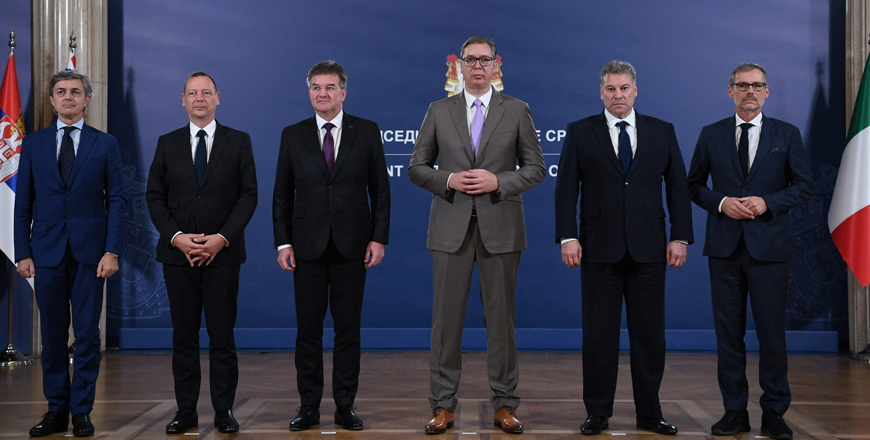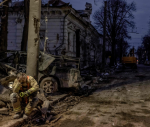You are here
Kosovo-Serbia: Key points in latest military stand-off
By AFP - Sep 28,2021 - Last updated at Sep 28,2021

NATO soldiers patrol near the border between Kosovo and Serbia in Jarinje on Tuesday over the weekend (AFP photo)
PRISTINA — The latest tensions between Serbia and Kosovo is the worst regional crisis in a decade, with Serbia boosting its military presence on their border.
The main issues revolve around on the sensitive position of Kosovo’s ethnic Serb minority, which refuses loyalty to the authorities in Pristina.
Here are the five things to know about the ongoing dispute, a major obstacle for both sides’ ambitions for European Union membership.
The root of the problem?
Ethnic-Albanian majority Kosovo declared independence from Serbia in 2008, a decade after a war between Serbian forces and ethnic Albanian guerillas.
Since then, Kosovo has been formally recognised by roughly a hundred countries — but not by Serbia, and most of the 120,000 remaining Kosovo Serbs remain loyal to Belgrade.
In Kosovo’s Serb-majority north bordering Serbia, they fly the Serbian flag, use its currency and refuse to pay taxes and utilities.
Local Serbs resist every attempt by Pristina to exercise its authority in northern Kosovo, leading to constant tension.
What sparked the crisis?
Officially, the latest crisis was over registration plates.
Kosovo banned drivers with Serbian plates from entering the country unless they took provisional Kosovar ones — which Serbia has required of Kosovar vehicles for years.
Hundreds of outraged ethnic Serbs blocked the roads leading to the two border crossings, and set up camps.
They were further outraged when Pristina deployed special police forces to the border.
Kosovo police have authority throughout country’s territory, but special units are rarely seen in the tense north as local Serb leaders interpret their presence as a provocation.
Serbia’s army responded by deploying combat vehicles with their guns pointed towards Kosovo, and flew fighter jets nearby — its first time show of military power since the war.
Will there be a war?
According to some experts, not this time.
Although Belgrade has threatened to “react within 24 hours” if violence is used against ethnic Serbs, a government-led conflict is not considered likely.
After retreating in 1999 in the face of a NATO campaign of air strikes, Serbia signed a treaty prohibiting their armed forces from Kosovo soil. Violating that would put Serbia on a collision course with NATO again.
The 3,500 NATO-led peacekeepers deployed in Kosovo, the KFOR mission, have stepped up patrols following the latest tensions.
“There is no risk of radicalising the situation”, military analyst Aleksandar Radic told local media.
“The mere presence of KFOR is signalling that neither side can do anything beyond what’s tolerable”.
Who benefits?
Political elites — both ethnic Albanian and Serb — apparently.
While the Kosovo Serb leaders do not recognise Pristina’s authority, they stand for election. Under Kosovar law, they have 10 parliament seats guaranteed, even a minister in the government.
Some analysts argue the latest tensions have been orchestrated for political ends in the run-up to the country’s mid-October municipal elections.
“The escalation of the crisis in the north... has an electoral background,” political analyst from Pristina Lulzim Peci told AFP.
Belgrade-based analyst Dusan Janjic took the same view.
“Parading armoured vehicles and flying the fighter jets is part of that marketing campaign which will eventually stop, in order to hold the elections,” he said.
What now?
Even if this is just posturing by both sides, the situation remains volatile. An incident on the ground could lead to an escalation, says experts.
The European Union, with Washington’s support, is trying to get both sides to the table, but a decade’s worth of EU mediation between two sides has brought little progress.
Belgrade has stressed Kosovo must pull back its special police from the north before things can get back to normal.
Serbia’s key ally Russia has also called on Kosovo government to pull back its special forces, after Russian ambassador visited Serbian army bases near Kosovo border over the weekend.
Related Articles
BRUSSELS — NATO chief Jens Stoltenberg on Thursday called for all sides to maintain calm in Kosovo after violence in May that wounded 93 pea
BANJSKA, Kosovo — Gunmen holed up in a northern Kosovo monastery clashed with authorities on Sunday, according to Prime Minister Albin Kurti
PRISTINA — An EU envoy warned Saturday that any delays in calming tensions between Kosovo and Serbia — which he described as more urgent tha

















